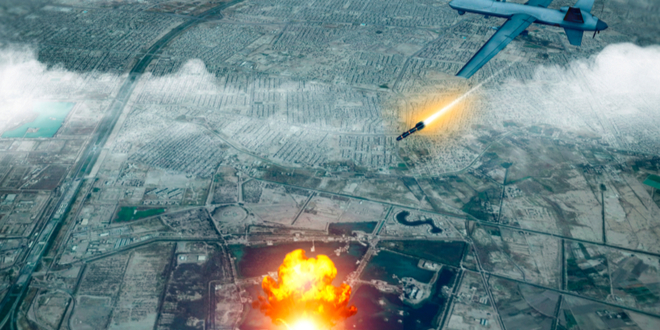Israel Defense Forces Chief of Staff Aviv Kochavi has approved Israeli drone strikes in the West Bank.
Lest you think Israel is waging war on the Palestinian people or the Palestinian Authority—the nominal government of the West Bank territory—it is not. The P.A. is under siege by Iranian-supported Palestinian Islamic Jihad and Hamas, and P.A. strongman Mahmoud Abbas is thoroughly incapable of defending the government or the people. He is looking to Israel to save him and his regime. And Israel, to the extent it can, will try.
To call the relationship complicated is a severe understatement, but it always, always goes back to Iran.
On the one hand, the P.A. is corrupt to its eyeballs, and increasingly, its own people have been protesting the regime’s failures; it is hugely repressive—it jailed people for their Facebook posts, and killed regime critic and journalist Nizar Banat; and it incites violence against Israel and Jews as a way to maintain its revolutionary credentials.
At the U.N. General Assembly, Abbas lauded “the righteous martyrs of the Palestinian people who enlightened the path of freedom and independence with their pure blood.” The Fatah website has been calling for violence against Israelis, and more than once Abbas has announced he is abrogating all the P.A. agreements with Israel—including those regarding security cooperation. But that’s only until he needs security cooperation with the IDF to survive.
Which is the other hand for him and for Israel.
In the midst of rumbling unrest among West Bank Palestinians, Abbas is facing the latest round of the Hamas-Fatah civil war that began after Israel withdrew from Gaza in 2005 and ended with the expulsion of the P.A. from Gaza in 2007. With no Israel and no Fatah inside Gaza, Hamas won security control of the area—which should be a warning against a precipitous Israeli withdrawal from the West Bank. With Iran as a patron, Hamas has since determined the level of aggression that would be used against Israel—and against Fatah.
Hamas presents itself to Palestinians as younger, stronger, and purer than the P.A., and the better guardian of Palestinian interests and holy places. Its claims are well-received by many, and Abbas plays “catch up,” diverting from his troubles by inciting his people to violence against Israelis, continuing to pay “salaries” to terrorists, and relying on the IDF at the end.
That may not be enough now.
The May 2021 Hamas rocket war against Israel ended in a ceasefire after Israel exacted a serious price. Following the ceasefire announcement, The Associated Press reported that thousands of Hamas supporters demonstrated against Abbas in the West Bank, chanting, “Dogs of the Palestinian Authority, out, out.” Hamas members were also seen victory dancing in Gaza. This April, Hamas flags flew above the Al-Aqsa Mosque during Ramadan.
For months, Israeli intelligence sources have been watching and reporting on Palestinian violence both in the West Bank and in Israel as a result of civilian frustration with the repressive and corrupt P.A., stoked by Hamas. And Iran. According to the authoritative Long War Journal, Hezbollah—Iran’s proxy in Lebanon—has been smuggling weapons into the West Bank. Those weapons benefit Hamas and can also be smuggled into the hands of disaffected Israeli Arab citizens.
(Side note: Almost 20 years ago, I traveled in Jordan with a group of retired American military officers. In Amman, Jordanian security forces took pains to explain to us that Jordan’s weapons “point inward.” To our blank looks, he added, “Our job is to interdict Hezbollah weapons coming through Syria, into Jordan, and then into the West Bank. We have to stop them. We don’t want Iran on the West Bank any more than Israel does.” The principle remains the same today—Iran threatens Jordan—but the interdiction capability appears to have eroded.)
Israel has only a few choices. It can try to save the corrupt, repressive, but non-Iranian-supported P.A., with the downside of abandoning the Palestinian people who have been protesting their rotten government, but with the upside of protecting Jordan. It can let the war on the West Bank continue and see where it goes, which could result in Iranian proxies to Israel’s north (in Lebanon and Syria), south (in Gaza) and east (in the West Bank), and the collapse of the Jordanian kingdom. That would be the result of Israel’s disassociation from the West Bank territories—the so-called “two state solution.”
Israel’s Prime Minister Yair Lapid did, in fact, call for “two states for two people” at the U.N., but the two people did not include Hamas, Islamic Jihad or Iran. Any agreement, Lapid said, would be conditioned on a “peaceful Palestinian state that would not threaten Israel.”
That strongly suggests that Israel will remain unhappily between Hamas/Islamic Jihad and Fatah; between Fatah and Iran; between Jordan and Iran. Between a rock and a hard place, where Iran is both the rock and the hard place.
Reprinted with author’s permission from Jewish Policy Center
The shortcode is missing a valid Donation Form ID attribute.




